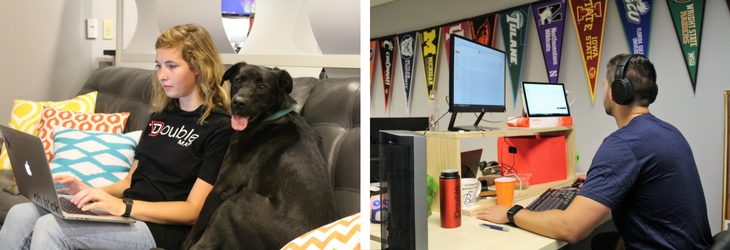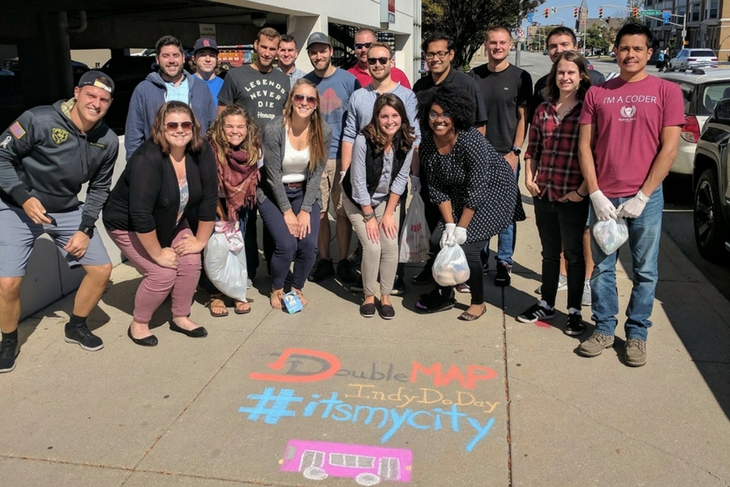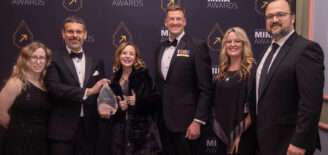DoubleMap – culture built on trust, transparency and putting people first
If you keep up with awards programs and “fastest growing” lists, then you’ve heard of the transit technology scale-up company DoubleMap. They provide software that enhances the rider experience and improves operational efficiency of transit systems at 150+ universities, municipalities, corporations, events, and airports worldwide, and their list of accrued honors is impressive.
DoubleMap grew its revenue by 3,415 percent and ranked 93rd on the Inc. 5000 “Fastest Growing Companies in America” list in 2016, and still ranked among the top 10 fastest growing Indiana tech companies this year. The Indianapolis Business Journal included DoubleMap on its IBJ Fast25 “Fastest Growing Private Companies” in the Indianapolis area in 2016 and 2017. DoubleMap is also a four-time “Best of Tech in Indiana” Mira Award winner, including Best Tech Startup in 2014, and Scale-up Company of the Year in 2017. (See the Inc. 5000 lists here and here. IBJ Fast25 lists here and here. Mira Awards here and here.)
There’s a lot of proprietary technology and complex algorithms undergirding that rapid growth. DoubleMap, along with its TapRide branded app (acquired in 2014), help people get to school or to work or safe rides home, they help them get there on time and they save students and taxpayers millions — both in real dollars and in hassle-free, transit systems they can easily track on mobile devices.
To date, the company is still 100-percent bootstrapped and the fast-growing tech company has actually been profitable since 2013. Like quite a few other tech firms in the area, DoubleMap’s customer base is primarily outside of Greater Indianapolis, which can sometimes cause a lack of connection with the local community.

Ilya RekhterCo-founder & CEO
As a company, though, DoubleMap is ready to change that. While the founders shied away from interviews and media coverage as a startup, they are finding as a growing scale-up company that their unique culture, flat and transparent management structure, and democratic approach to making business decisions are popular draws for top talent. It’s a story that they are finally ready to tell.

When it comes to culture, Rekhter and Chief of Staff Megan Dixon never mentioned the ping pong or foosball tables I walked past in their open-concept downtown office space to get to the conference room. They talked first about transparency.
DoubleMap has monthly town halls where one of the teams — sales, operations and development — presents on their quarterly achievements and goals for the next quarter, and management updates everyone on company performance, including the financials that are usually hidden from employees at other companies.

Megan DixonChief of Staff
Of course, it’s not all business all the time. Three years ago they started an annual all-company retreat and spent a weekend in Brown County. The past two years that all-company, all-expenses paid retreat has been held in Las Vegas.
“Something happens when you get out of the office environment and get to know and care about the people you work with — it’s not about becoming best friends, though our teams are pretty close. It’s about understanding what drives the people you’re sitting next to, knowing that they are working just as hard as you because their success impacts your own and that we’re all working toward achieving shared goals that make us a successful company.”

DoubleMap currently has 50 full-time employees and another 25 part-time contributors. The company has doubled in size every year for several years in a row in terms of employees as well as customers and revenue. They continue to hire for roles in a variety of disciplines.
DoubleMap has a habit of making non-traditional hires, as Rekhter describes them, recounting stories of several team members who are doing work today that is quite different from their backgrounds, including Dixon. DoubleMap’s hiring process has become more purposeful as the company has grown and candidates also attend “cultural interviews” with their future team members over lunch.
“Megan worked at a church before we convinced her to come and join us. One of our senior project managers ran an animal shelter and our sales manager was a mechanical engineer at Cummins,” Rekhter said. “If we hired based on resumes alone we might have passed on the chance to work with key contributors who have been and still are a big part of our success today.
“Sometimes you meet people through networking or happenstance and just know you want to work with them. We’ve actually created new positions and brought people on board because we felt so strongly that they were such a good fit for our company, despite not having the right opening at the time. I think that’s something that sets us apart. Our focus on complete transparency and trust and putting our people first.”


